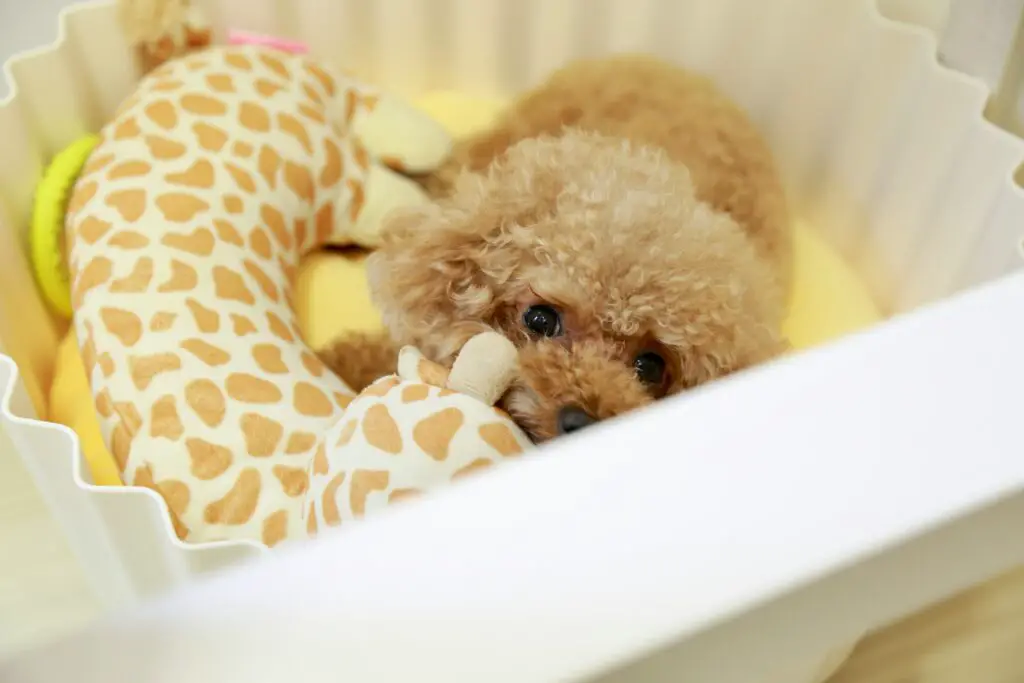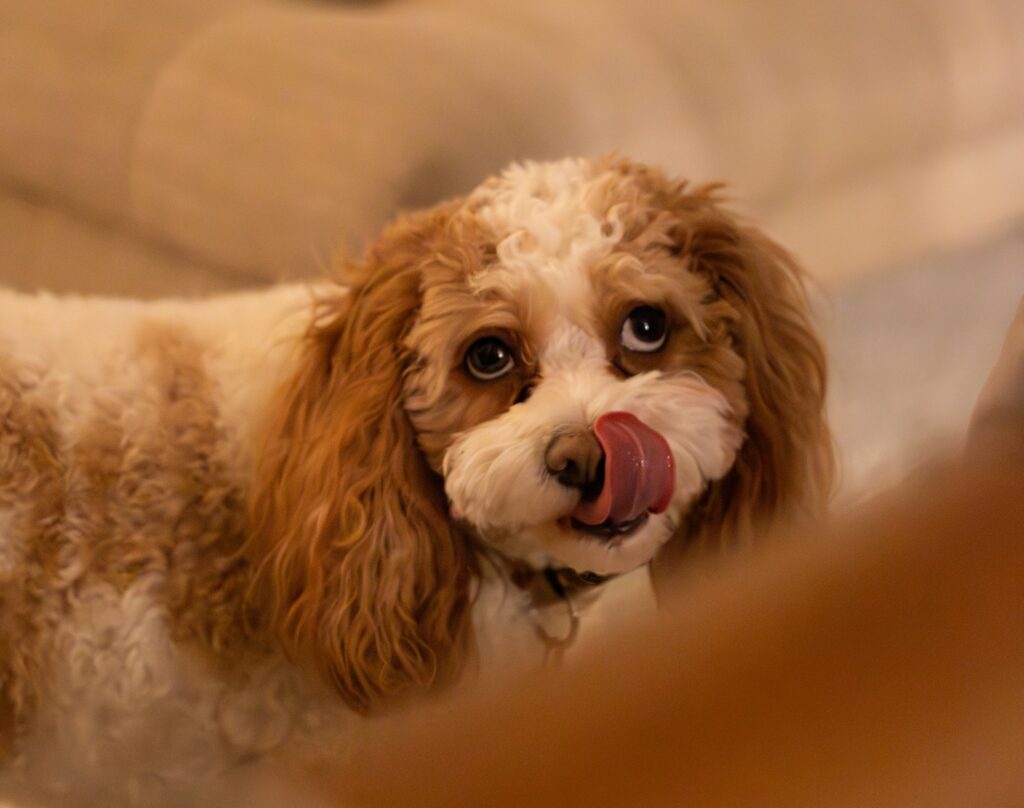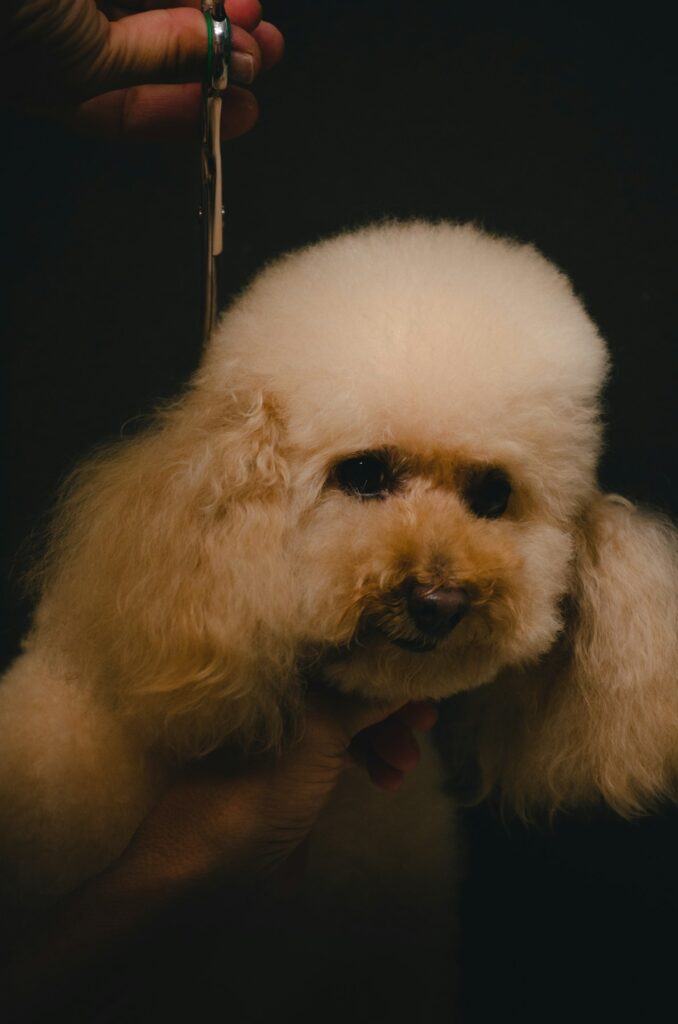You’re a dog lover looking for a new furry friend to join your family. While there are so many breeds to choose from, toy poodle stand out as one of the best for several reasons. In this article, we’ll explore 16 reasons why they make the perfect dog for you. From their intelligence to their adaptability, toy poodles have a lot going for them. As a loyal and loving companion, a toy poodle will quickly become your new BFF. Keep reading to learn why they might be the ideal dog breed for you and your lifestyle. With their cute curly coats and lively personalities, these pint-sized pups will capture your heart.
Table of Contents
Characteristics
The Toy Poodle is one of the most popular and beloved dog breeds, and for good reason. Their small size, minimal shedding, and friendly temperament make them an ideal companion animal for many.

Size
Their bodies stand under 10 inches tall at the shoulder, weighing between 6 to 9 pounds. Their diminutive size means they adapt well to small living spaces and can travel easily. However, their small stature also means they require extra care and supervision to avoid injury.
Hypoallergenic
They have a dense, curly coat that produces little dander. This makes them a good choice for people with allergies. Although they still require regular grooming to keep their coat tangle-free, they shed very little compared to most dogs. With weekly brushing and bathing, They can make great companions even for those with sensitive noses and allergies.
Temperament
Despite their fancy appearance, they make playful, energetic companions. They are very intelligent and thrive on human interaction and mental stimulation. Although sometimes seen as yappy or snobby, Toy Poodles that are well-socialized from an early age can make very friendly, gentle pets. They form close bonds with their owners and love spending time together, whether playing, cuddling, or going for walks.
Trainability
Their intelligence makes them very responsive to training. They pick up on commands and tricks quickly and enjoy the mental challenge of learning new skills. However, their stubborn streak means patient, positive reinforcement training is most effective. Harsher discipline will likely backfire. With kind, reward-based training, they can become well-mannered and obedient, and they excel in activities like agility, obedience, and tricks.
Grooming
While they do not shed much, they require frequent grooming to keep their curly coat from matting and tangling. Most owners opt to keep the coat clipped short, in a “puppy cut.” Regular bathing, brushing, nail trimming, and teeth brushing are also needed to keep a Toy Poodle clean and healthy. Although grooming a Toy Poodle requires dedication, many owners find brushing and bathing their Poodle a rewarding bonding experience.
Appearance
Charming and Dainty
With their fluffy, hypoallergenic coat and petite stature, they have an irresistible charm. Their endearing qualities and dainty appearance make them a delight to have around. Weighing only 4 to 6 pounds fully grown, you can easily carry them around and they take up little space. Yet despite their small size, they have a lively, energetic spirit and contagious zest for life.

Elegant and Stylish
They are puffy, curly coat gives them an elegant appearance reminiscent of an upper-class gentleman. Their coat comes in a variety of solid colors including black, brown, silver, red, and apricot. With regular grooming, their coat can be trimmed into a variety of stylish cuts. Whether sporting a continental clip, English saddle clip, or puppy clip, they are always looks poised and polished.
Minimal Shedding
For those with allergies, the toy poodle is an ideal choice. Their curly, hypoallergenic coat is non-shedding, so they produce little dander. They require frequent grooming to prevent mats and tangles, but in exchange, you get a playful companion without the mess of loose hairs. Weekly brushing, bathing, and trimming is typically needed to keep them well-groomed.
With their charming appearance, dainty size, and minimal shedding coat, they make an adorable and stylish companion for those looking for a high-energy yet pint-sized dog. Despite their small stature, they have a big personality and make a perfect pet for city or apartment living. Their cute and cuddly looks combined with an elegant style gives the toy poodle a chic and polished appearance that is sure to turn heads.
Temperament
They are playful, energetic and intelligent dogs. Their temperament makes them ideal companions for families or individuals looking for an affectionate pet.
Friendly and Sociable
These dogs are very friendly towards people and other dogs. They are outgoing, energetic and love being around their owners and families. Their sociable nature means they make friends easily and enjoy meeting new people and dogs. However, early socialization is still important to help toy poodles develop good behavior and learn how to interact properly with others.
Playful and Energetic
Don’t let their small size fool you, they are energetic, playful dogs. They love playing fetch, learning tricks and puzzles that challenge them mentally and physically. While they don’t require as much exercise as larger breeds, they still need daily activity and playtime with their owners to stay happy and healthy. Puzzle toys and games that require problem-solving also keep them stimulated when alone.
Intelligent and Responsive
This breed of dogs are highly intelligent dogs and are very responsive to training. They can learn commands and tricks easily through positive reinforcement training with treats, play and praise. However, their intelligence also means they can get bored easily without proper stimulation. Obedience training and learning new tricks or skills regularly will keep a toy poodle engaged and help strengthen the bond with their owner.
With their friendly, energetic and intelligent temperament, it’s easy to see why they make such perfect companions and family dogs. Early socialization and training, combined with daily play and exercise, will ensure a toy poodle develops into a well-adjusted, well-behaved pet. While grooming them does require frequent brushing and trimming, their wonderful temperament makes it worth the effort for many dog owners.
Living Needs
These dogs may be small in size, but they have some very specific living needs to keep them happy and healthy. Make sure you dedicate enough time each day to walk, play with, and train your dog. They can become anxious or develop behavioral issues if they do not receive enough mental and physical stimulation.
Diet
These dogs require a high-quality dog food that is specifically formulated for small breed dogs. Look for a dog food with a named meat like chicken, beef or fish as the first ingredient. They can be prone to hypoglycemia so multiple small meals throughout the day are best. Limit treats to no more than 10% of their daily calories to avoid obesity. Always have fresh, clean water available for your dog no matter the breed.
Grooming
While this breed of dogs do not shed much, they require frequent grooming to keep their coat clean and prevent mats. Aim for brushing two to three times a week and bathing once a month or as needed. They need to visit a professional groomer every 4 to 6 weeks for trimming, clipping, and nail care. Their long fur can easily become tangled and matted if not properly maintained.
Health
This breed of dogs can live 12-15 years or more, so be prepared to commit the time needed to keep them healthy. Take your dog for annual checkups with a vet, keep them up-to-date on vaccinations, and get regular dental cleanings and nail trims. They are prone to certain health issues like patellar luxation, epilepsy, and hypoglycemia. Watch your dog closely for any signs of illness and contact your vet right away if you notice any concerning symptoms.
Providing the proper living space, high-quality food, frequent grooming, exercise, play, and vet care will help ensure your toy poodle lives a long, happy, and healthy life. While toy poodles have some specific needs, their loving and playful nature makes the effort well worth it.

Care
Toy poodles may be small, but they still require daily care and grooming. Their coat needs frequent brushing and bathing to prevent mats and tangles. You should aim to brush your toy poodle two to three times a week with a slicker brush and metal comb. Bathing once a month or every other month is typically sufficient. Be sure to use a high-quality dog shampoo and conditioner to keep their coat clean and moisturized.
Grooming
In addition to brushing and bathing, toy poodles need regular grooming and trimming. Their coat grows continuously and needs to be trimmed every 4 to 6 weeks. It is best to take your toy poodle to a professional groomer to trim their coat, nails, and for anal gland expression. At-home grooming requires proper training and technique to avoid injury. Professional grooming will also help ensure their coat is trimmed in a stylish cut, such as the classic poodle pouf or a shorter puppy cut.
Dental Care
Don’t forget about your toy poodle’s teeth and gums! Brush their teeth with dog toothpaste and a toothbrush at least two to three times a week to remove tartar buildup and promote gum health. Annual dental cleanings performed by your vet are also important to check for any oral health issues. Bad breath in dogs can often be a sign of dental disease, so monitor your toy poodle’s breath and take them to the vet if there are any concerns.
Exercise
While toy poodles have a smaller stature, they are still energetic dogs and need daily exercise and play. Aim for at least 30 minutes of activity per day, such as walks, fetching toys, puzzle toys, and playtime with you. Lack of exercise and mental stimulation can lead to behavioral issues in toy poodles like excessive barking, chewing, and hyperactivity. Be sure to also give your toy poodle plenty of affection and belly rubs every day – they are a companion breed and thrive on human interaction and bonding.
With proper care and grooming, toy poodles can live up to 18 years. Keeping them clean, active, and socialized will ensure your toy poodle lives a long, healthy and happy life by your side.
Health
Toy Poodles are generally very healthy dogs with a long lifespan of up to 18 years. However, like any breed, they are prone to certain health conditions. Regular vet checkups and proper care can help catch any issues early and keep your Toy Poodle happy and healthy.
Toy Poodles may be susceptible to bladder stones or infections, so make sure your vet checks for these during routine care. Their long, fluffy coat also requires frequent grooming to prevent painful mats and skin irritation. Trim your Toy Poodle’s nails regularly as well, since their small paws can make overgrown nails uncomfortable.
- Progressive retinal atrophy (PRA) is an inherited disease that can lead to blindness in Toy Poodles. Reputable breeders will have their dogs’ eyes tested and cleared of this condition before breeding. Ask about the eye exam results for a puppy’s parents to avoid supporting irresponsible breeders.
- Toy Poodles can also suffer from slipped stifle, a condition where the kneecap slips out of place. Keep your Toy Poodle at a healthy weight and avoid vigorous exercise that could aggravate or cause this issue.
- Like many small breeds, Toy Poodles are prone to dental problems and tooth loss. Brush your Toy Poodle’s teeth regularly with a vet-approved dog toothpaste and have their teeth professionally cleaned by a vet when needed.
- Toy Poodles can live well into their teen years, so senior care is important for a long, happy life. Monitor your aging Toy Poodle closely for conditions like canine cognitive dysfunction syndrome, and work with your vet to keep them comfortable as they get older.
Providing high-quality food, plenty of exercise, regular grooming, and routine vet care will help ensure your Toy Poodle companion stays happy and healthy for years to come. With the proper precautions taken, Toy Poodles can make ideal lifelong friends.

Common Health Problems
Toy Poodles are generally healthy dogs, but like all breeds, they can be prone to certain health issues. Be aware of these common problems in Toy Poodles so you know what symptoms to look out for.
One of the most common issues for Toy Poodles is dental disease. Their small mouths mean teeth are often overcrowded, allowing tartar buildup and infection. Brush your Poodle’s teeth several times a week and have your vet perform regular dental cleanings to remove any tartar. Without treatment, dental disease can lead to tooth loss and other problems.
Eye issues are also frequent in Toy Poodles. Conditions like cataracts, progressive retinal atrophy, and corneal ulcers can cause vision loss if left untreated. Take your Poodle for regular vet checks and eye exams, especially as they age. Cataract surgery and other procedures may help prevent permanent vision loss.
Toy Poodles can be prone to joint and bone problems like Legg-Calve-Perthes disease, which affects the hip joints. Signs include limping, difficulty rising, and loss of muscle mass in the legs. Early diagnosis and treatment is critical to managing pain and preventing arthritis.
Tracheal collapse is another issue more common in Toy breeds with narrow windpipes. The trachea can flatten, causing coughing, difficulty breathing, and a honking sound. While not usually life-threatening, treatment may require medication, rest, and in severe cases, surgery.
Hypoglycemia, or low blood sugar, can also occur in Toy Poodles, especially in puppies. Signs include lethargy, weakness, and seizures. Be very consistent with feeding schedules for puppies and never go longer than 6-8 hours between meals. Nutritional supplements and diet changes may also help.
With good care and regular veterinary checkups, many Toy Poodles live long and healthy lives. However, knowing about these potential health issues, their symptoms, and available treatments or preventatives can help keep your Poodle happy and by your side for years to come.
Diet and Nutrition
Toy poodles may be small in size, but they still need high-quality nutrition to stay healthy and energetic. As an owner, it’s important to feed your toy poodle a diet specially formulated for small breed dogs to meet their unique nutritional needs.
Look for a high-quality kibble or wet food for toy and small breed dogs. These foods have smaller kibble pieces that are easier for your petite poodle to chew, and they are packed with more calories and nutrients per cup to account for higher energy needs. Wet or dry, make sure the first ingredient is a high-quality animal protein like chicken, fish, or lamb. Meat-based proteins provide essential amino acids for muscle health and a shiny coat.
Limit treats to no more than 10% of your toy poodle’s daily calories to avoid obesity and nutritional imbalance. Good options include diced chicken, carrot sticks, blueberries and commercial small breed treats. Measure out portions to keep your poodle at a healthy weight. Toy poodles only need 1/4 to 1/2 cup of high-quality kibble per day, split into two or three meals.
Always have fresh, clean water available for your toy poodle. Dehydration is a risk for these little dogs, so check the water bowl frequently and refill when low. You should also schedule regular vet checkups to monitor your poodle’s weight, nutrition and for any supplements that may be needed.
Feeding your toy poodle a diet tailored to their size and high energy needs will help keep them happy, healthy and thriving for years to come. Be sure to talk to your vet for the best recommendations for your dog’s unique nutritional requirements. They’re more than just a fashionable companion – toy poodles need high-quality nutrition and the best care, just like any dog.
Behavior and Training Tips for Toy Poodles
Toy poodles are highly intelligent, energetic dogs and require patient, positive training to curb unwanted behaviors. Early socialization and training are crucial for these pint-sized pups.
Take your toy poodle to puppy classes or work with a trainer to help socialize them from an early age. Expose them to many different people, sights and sounds in a controlled, positive setting. This helps prevent shyness, aggression and anxiety in toy poodles.
Use positive reinforcement training with treats, praise and play. Harsh discipline will backfire and cause behavioral issues. Keep training sessions short, around 5 to 10 minutes, to prevent your toy poodle from getting bored or frustrated.
House train your toy poodle as early as possible. Take them out frequently, especially after they eat, drink or wake up. Crate training can help speed up house training and prevent separation anxiety. Give them interactive dog toys to play with to keep them stimulated when alone.
Toy poodles require daily exercise and play to release pent-up energy and prevent behavior problems. Take your toy poodle for several short walks per day or play interactive games like fetch, tug-of-war or agility courses set up in your backyard. Puzzle toys that dispense treats as they play can keep toy poodles engaged for hours.
Gently brush and bathe your toy poodle regularly to keep their coat clean and prevent mats or tangles. Get them accustomed to grooming at an early age. Brush their teeth a few times per week to promote good dental health and fresh breath. Trim their nails if they get too long.
With the proper care, socialization and training, toy poodles can make wonderful lifelong companions. Their playful, gentle temperament and eagerness to please often endear them to their owners. Following these tips will help ensure your toy poodle develops into a well-adjusted, well-mannered member of your family.
FAQ: Are Toy Poodles Social?
Absolutely! Toy Poodles are very social dogs and love being around people. They make great companions and bond very closely with their owners and families.
Toy Poodles were originally bred as companion dogs for royalty and the wealthy, so they’re naturally inclined to be friendly and enjoy human interaction and attention. They love spending time with their owners and being involved in family activities. Toy Poodles are playful, energetic and enjoy playing with toys and games with their families.
Although Toy Poodles have a reputation for being a bit snippy or yappy, this is usually due to lack of socialization and training. When properly socialized from an early age, Toy Poodles are friendly towards new people and other dogs. They tend to be good with children and other pets, especially if raised with them.
Toy Poodles thrive on human companionship and do not do well if left alone for long periods. They can suffer from separation anxiety if left alone for too long. Toy Poodles should not be left alone for more than 4-6 hours at a time. They do best in homes where they can spend lots of time interacting with their families.
Toy Poodles are highly intelligent dogs and need mental stimulation to prevent boredom and behavioral issues. Puzzle toys, learning new tricks and commands, and playtime with their owners are great ways to keep a Toy Poodle’s mind active and prevent separation anxiety or other behavior issues from developing.
Overall, Toy Poodles are very social, friendly and bond very closely with their families. While they require time, attention, exercise and training, Toy Poodles make wonderful lifelong companions for individuals and families looking for a playful and devoted small dog breed.
Conclusion
And there you have it! 16 convincing reasons why toy poodles are the perfect dogs for practically any home. With their small size, amazing intelligence, hypoallergenic coats, and winning personalities, toy poodles can fit into any lifestyle. They will easily charm everyone they meet and become loyal companions for years to come. Thanks for joining me on this exploration of why toy poodles are simply the best dogs around. I hope you now agree that welcoming one of these special pups into your life is an excellent idea. Just beware – toy poodles are known to capture their owners’ hearts completely. Once you get one, you may find yourself wanting more!
- Smelly House Because of Dog? Take These Hygiene Tips - May 20, 2025
- How to Introduce a Dog To a Cats Without Chaos - May 6, 2025
- 4 Best Cavapoo Rescues in the UK 2024 - April 5, 2024








